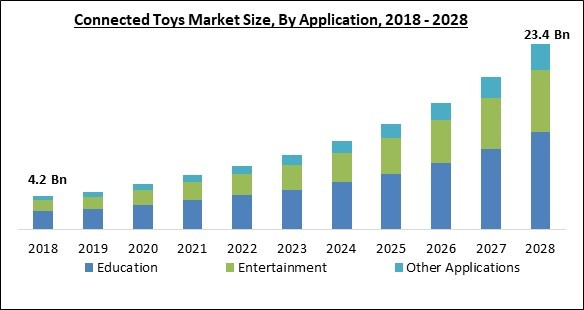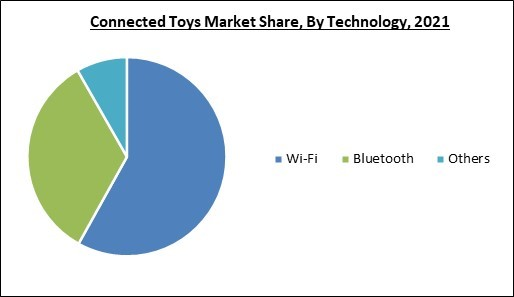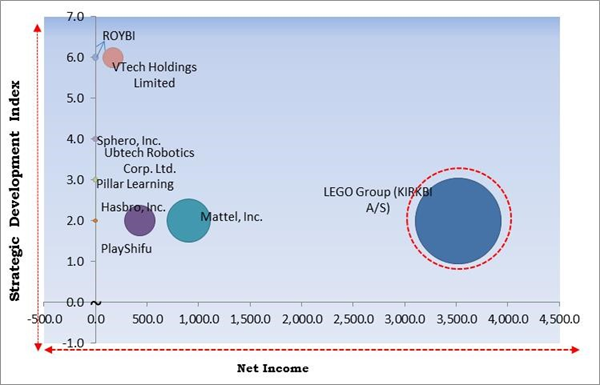Toys that are connected to the internet and use Bluetooth or WiFi to process functions are known as connected toys. A speaker, microphone, and app to process the data are typically included. In response to children's increasing access to screens, connected toys are changing traditional objects to include more of the appointment features that digital screens offer.
However, by taking advantage of this development, linked toys raise more concerns among parents and educators about children's use of reflexive digital technologies. With the help of connected toys, families and parents may actively participate in and closely monitor their children's development, generating data that will help parents better understand the events that their kids are involved in and create connections between play and parent-child discussions.
An increase in the number of parents and kids using the internet, which successfully combines education and entertainment while allowing parents to keep an eye on their children, is what drives market expansion. In addition, the market for connected toys is being driven by the growing popularity of technology, science, math, and engineering toys.
However, the market for linked toys is constrained by a lack of safety and security. On the other hand, increasing government restrictions to regulate security breaches and R&D investment in toys and robots offers an opportunity to push the market for connected toys.
COVID-19 Impact Analysis
The worldwide coronavirus outbreak had a significant negative impact on the world’s economy. Lockdowns have been imposed in numerous countries all over the world in an effort to halt the coronavirus's transmission and spread. This had a significant negative impact on the building toy industry's distribution networks, commerce, and growth. Additionally, the sale of toys on various e-commerce websites has surged since the COVID-19 pandemic, which could increase the need for more connected toys over the projection period.Market Growth Factors
Rising Working Women and Less Time to Take Care of Children Rising Need for Tracking Toy Devices
Humans are now more connected than ever due to the Internet of Things. Today smartphones provide unlimited access to practically everything, including GPS, banking, social networking, everyday phone, and text communication, online shopping, and more. In the last ten years, technology has advanced beyond the screens. Most homes, automobiles, and children's toys all contain it. IoT devices have significant advantages for parents and careers.Parents Are More Concerned with The Overall Development of Their Children
Parents are looking for ways to get their kids interested in new physical activities because they are worried that they may get addicted to computers TV and cell phones. Kids may exercise their minds while also improving their creativity and social skills with the help of connected toys. Children can purchase modern connected toys from vendors, including IoT enabled car toys. Due to parents' increased focus on instilling in their children useful problem-solving and life skills, the market for technology enabled toys has grown.Marketing Restraining Factor:
Concerns about privacy are being raised by connected toys
More and more kids' toys are being sold with internet connectivity as a crucial component. The internet connection can be established with a wire that attaches to a computer or router, but it is more likely to be established using a wi-fi-enabled app on a smartphone or tablet. Since they have the ability to collect and handle personal data through features like cameras and microphones, connected toys and devices give rise to particular security concerns.Application Outlook
Based on application, the connected toys market is segmented into education, entertainment and other applications. The education segment dominated the connected toys market with maximum revenue share in 2021. Children's sensory-motor skill development is correlated with the use of educational toys. Young children's perception of sight is enhanced by bright, colorful lighting and music. This will help kids develop stronger personalities and communication skills.Age Group Outlook
On the basis of age group, the connected toys market is fragmented into 1- 5 years, 6-8 years, 9-12 years and teenagers (13-19 years). In 2021, the 9-12 years segment covered a significant revenue share in the connected toys market. Kids between the ages of 9 and 12 enjoy playing games, using tablets, playing musical instruments, and listening to music. Popular STEM-related games and toys let kids construct robots using complex problem-solving techniques.Technology Outlook
On the basis of technology, the connected toys market is divided into Wi-Fi, Bluetooth, and other technologies. In 2021, the Wi-Fi segment recorded the highest revenue share in the connected toys market. These interactive toys use wireless connections to online databases to recognize sounds and images, as well as to recognize and respond to children's questions, instructions, and requests.Interfacing Device Outlook
By interfacing device, the connected toys market is divided into smartphone/tablet, and PC/laptop. In 2021, the smartphone/tablets segment garnered a significant revenue share in the connected toys market. As children work through the tutorials & learn independently, the tablet aims to support the development of fundamental skills in mathematics, science, reading, problem-solving, music, logic, and creativity.Distribution Channel Outlook
Based on distribution channel, the connected toys market is classified into online, and offline. In 2021, the offline segment witnessed the highest revenue share in the connected toys market. Toy vendors can communicate with their customers in a variety of ways through the offline distribution channel for linked toys. One of the most popular ways for suppliers of connected toys to get in touch with regional distributors and retailers is by taking part in trade exhibitions.Regional Outlook
Region wise, the connected toys market is analyzed across North America, Europe, Asia Pacific and LAMEA. The North America region led the connected toys market with the maximum revenue share in 2021. The use of linked toys has grown significantly in the North American market, and this trend is predicted to continue throughout the forecast period. The existence of prominent players in the connected toy industry is anticipated to play a significant role in the market's expansion.The Cardinal Matrix - Connected Toys Market Competition Analysis
The major strategies followed by the market participants are Partnerships. Based on the Analysis presented in the Cardinal matrix; LEGO Group (KIRKBI A/S) is the forerunner in the Connected Toys Market. Companies such as Mattel, Inc., Hasbro, Inc., VTech Holdings Limited are some of the key innovators in Connected Toys Market.
The market research report covers the analysis of key stakeholders of the market. Key companies profiled in the report include Hasbro, Inc., Mattel, Inc., LEGO Group (KIRKBI A/S), VTech Holdings Limited, ROYBI, Pillar Learning, Ubtech Robotics Corp. Ltd., PlayShifu, Sphero, Inc. and Mainbot SAS
Strategies Deployed in Connected Toys Market
- Sep-2022: The LEGO Group came into a partnership with Food Panda, an online food and grocery delivery platform. This partnership aimed at expanding quick commerce for toys.
- Jul-2022: Mattel teamed up with SpaceX, an American spacecraft manufacturer, space launch provider, and satellite communications corporation. Under this collaboration, Mattel & SpaceX would develop iconic toymaker products that inspire children & collectors alike to tap into their inner space explorer.
- Jul-2021: VTech launched the 2021 Kidi Tech collection. By this launch, VTech continues to be at the forefront of innovation with its new collection, offering children the on-trend technology features they want in kid-friendly, age-appropriate devices.
- Mar-2021: ROYBI partnered with Douglas Stewart EDU. a leading distributor with a focus on educational resources and technologies for the education marketplace. By this partnership, the ROYBI would implement its award-winning educational robot, Roybi Robot, to schools & educational institutions as well as expand its presence in the UK and Europe.
- Feb-2020: ROYBI took over KidSense.AI, the leading speech recognition AI platform. This acquisition would enable Roybi Robot to offer the most powerful AI engine in language learning across the globe. The acquisition would support the brand portfolio enabling ROYBI to accelerate the development of additional languages along with maintaining privacy and accuracy for children globally.
- Sep-2019: VTech released Kidi Star Dance, an innovative new toy that lets kids play games, learn popular moves & dance along with the music. The launch would be a part of VTech's Kidi line of electronics, which also includes the new KidiGo Walkie Talkies and Kidizoom Pixi.
- Aug-2019: Sphero completed the acquisition of littleBits, a New York City-based startup. This acquisition aimed at building on each other’s strengths to become an even more massive player in the education space.
- Apr-2019: UBTECH Robotics unveiled Star Wars fans, its first-ever humanoid robot inspired by the Marvel Cinematic Universe (MCU): the Iron Man MK50 Robot. This launch would mark UBTECH's entry into the world of connected play pairs advanced robotics with augmented reality (AR) with aim of giving kids & adults an exceptional superhero experience.
- Nov-2018: PlayShifu introduced Orboot, a globe enhanced by Augmented Reality for kids learning. This launch enables children to explore the world beyond boundaries through the companion app, providing an immersive & interactive learning experience.
- Aug-2018: Pillar Learning launched Codi, an AI interactive children's toy. This launch aimed at reducing children's daily screen time. Codi provides children with customized, interactive content & developmental support outside of the classroom.
- Feb-2018: Hasbro partnered with Nickelodeon, the number-one entertainment brand for kids. This partnership aimed at designing a full PLAYSKOOL toy line, inspired by the series.
Scope of the Study
By Application
- Education
- Entertainment
- Other Applications
By Age Group
- Teenagers (13-19 years)
- 9-12 years
- 6-8 years
- 1- 5 years
By Technology
- Wi-Fi
- Bluetooth
- Others
By Interfacing Device
- PC/Laptop
- Smartphone/Tablet
By Distribution Channel
- Offline
- Online
By Geography
- North America
- US
- Canada
- Mexico
- Rest of North America
- Europe
- Germany
- UK
- France
- Russia
- Spain
- Italy
- Rest of Europe
- Asia Pacific
- China
- Japan
- India
- South Korea
- Singapore
- Malaysia
- Rest of Asia Pacific
- LAMEA
- Brazil
- Argentina
- UAE
- Saudi Arabia
- South Africa
- Nigeria
- Rest of LAMEA
Key Market Players
List of Companies Profiled in the Report:
- Hasbro, Inc.
- Mattel, Inc.
- LEGO Group (KIRKBI A/S)
- VTech Holdings Limited
- ROYBI
- Pillar Learning
- Ubtech Robotics Corp. Ltd.
- PlayShifu
- Sphero, Inc.
- Mainbot SAS
Unique Offerings
- Exhaustive coverage
- The highest number of market tables and figures
- Subscription-based model available
- Guaranteed best price
- Assured post sales research support with 10% customization free
Table of Contents
Companies Mentioned
- Hasbro, Inc.
- Mattel, Inc.
- LEGO Group (KIRKBI A/S)
- VTech Holdings Limited
- ROYBI
- Pillar Learning
- Ubtech Robotics Corp. Ltd.
- PlayShifu
- Sphero, Inc.
- Mainbot SAS
Table Information
| Report Attribute | Details |
|---|---|
| No. of Pages | 268 |
| Published | October 2022 |
| Forecast Period | 2021 - 2028 |
| Estimated Market Value ( USD | $ 6833.2 Million |
| Forecasted Market Value ( USD | $ 23438.5 Million |
| Compound Annual Growth Rate | 19.7% |
| Regions Covered | Global |
| No. of Companies Mentioned | 10 |











